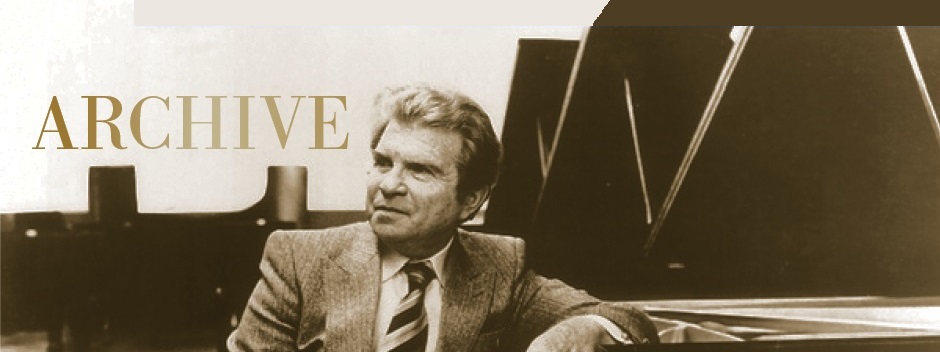In 1938 Gilels and Flier set off to the notoriously difficult (in programme and competitor ranking) International Brussels Competition. They were expected to uphold the victories of the Soviet violinists, lead by David Oistrakh two years earlier, and to return in triumph.
The programme requirements were incredibly demanding with three rounds and the additional requirement to include in the final round (alongside a solo programme and concerto) a concerto that was especially commissioned for the competition by a Belgian composer – the score of which was provided only a week in advance.
The jury of the competition was made up of eminent musicians including Leopold Stokowski, Otto Klemperer, Walter Gieseking, Emil von Sauer, Carlo Zecchi, Robert Casadesus and Samuil Feinberg. These musicians knew that despite the incredibly high standard of all the finalists, before them stood a great pianist of the twentieth century – Emil Gilels. Gilels was awarded the first prize and Flier took the third.
What did they hear in the playing of this young titan? Apart from the spellbinding virtuosity and emotional intensity, the logic of the whole and the thorough conception and projection of all the details, the unique sound (which even despite his critical inclination towards Gilels, Neuhaus called ‘golden’), the pulsating ‘live’ and elastic rhythm, huge dynamic range, flawless command of time, discipline, reliability and much more; the jurors appreciated his impeccable taste, sincerity of emotion and Classical economy of means that is inherent only to the greatest musicians, and as a rule acquired at the end of one’s creative life. Gilels was already both an important Artist and a pianist ‘without weaknesses.’ Through the medium of the piano he could achieve anything.
The whole musical world began to talk about Gilels. Following the competition he was meant to embark on a lengthy concert tour, including a tour of the USA. These plans were abruptly interrupted by the Second World War. On home soil Gilels became a hero: he received a medal for his achievements, was greeted by a welcome party upon his return and in the Soviet consciousness his name sounded in equal rank with the names of famous explorers, pilots and film stars. He became the embodiment of an epoch – whilst this contributed to his popularity in this youth, it had serious repercussions throughout his later life (especially in musical circles). By becoming emblazed as a beacon of all ‘Soviet’ in Art it was easy to overlook that this label had nothing to do with the inner content of Gilels’ pianism.
In spite of the fact that Europe and America had primarily only heard Gilels through radio broadcasts (he had only been able to give a few concerts in Belgium and France), news of the amazing pianist reached Sergei Rachmaninov. Rachmaninov had already heard of Gilels in the aftermath of the All-Union Competition through letters sent to him from friends in Moscow, and now he began to listen to Gilels’ radio performances. Rachmaninov decided that Gilels alone was worthy of being called his successor in terms of pianism and even went so far as to send him his medal and diploma. This medal, engraved with the profile of Anton Rubinstein, and diploma were once presented to Rachmaninov to symbolize his succession from Rubinstein, and Rachmaninov himself added Gilels’ name to the document. Emil Gilels treasured these relics all his life and through his incredible modesty kept the fact of these possessions shrouded in silence.
Gilels completed his postgraduate studies in 1938 and began teaching at the Moscow Conservatory (from 1952 becoming a professor). His pedagogical work continued sporadically until 1976, but because of the huge demands of his concerts he could not devote much time to teaching. Nevertheless his class numbered important pianists such as Marina Mdivani, Valery Afanassiev, Igor Zhukov and the pianist-composer Vladimir Blok.


